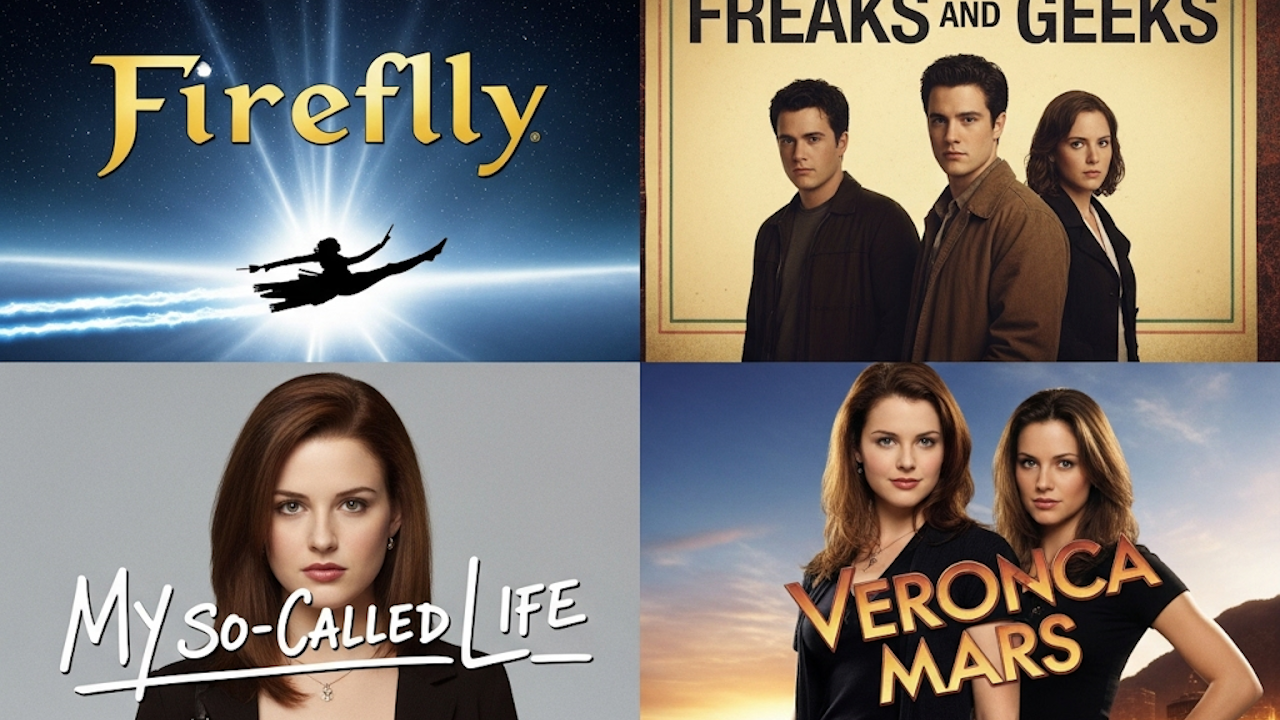Television has always been unpredictable. Even well written shows with passionate fan bases can be taken off the air before they reach their full potential. Sometimes it is because of low ratings, network changes, or decisions that have nothing to do with the quality of the program itself. What is left behind is a sense of what could have been. Over the years, many series have built loyal followings despite being cut short, and their influence often lingers long after the final episode. Here are several shows that were canceled too soon and why they continue to be remembered.
Firefly
No list of prematurely canceled shows would be complete without Firefly. Created by Joss Whedon, this space western combined humor, adventure, and heartfelt character dynamics. Unfortunately, Fox mishandled the series by airing episodes out of order, which confused audiences. After only 14 episodes, the show was canceled, leaving fans devastated. The demand for more was so strong that it led to the film Serenity, which tied up some storylines but still left viewers wishing for more. Today Firefly is often cited as a prime example of how network interference can doom a show regardless of quality.
Freaks and Geeks
Freaks and Geeks ran for only one season on NBC from 1999 to 2000, yet it launched the careers of actors like James Franco, Seth Rogen, Linda Cardellini, and Jason Segel. The show offered an authentic look at high school life in the 1980s, balancing humor with the awkwardness and pain of adolescence. Critics praised its realism and emotional depth, but it struggled with ratings. Over time it has become a cult classic, beloved for its relatable characters and for capturing what it feels like to grow up on the fringes of popularity.
Pushing Daisies
Pushing Daisies was unlike anything else on television when it premiered in 2007. Created by Bryan Fuller, the series told the story of Ned, a pie maker who could bring the dead back to life with a single touch. Its whimsical storytelling, colorful production design, and fairy tale tone set it apart from other shows. Despite critical acclaim and a loyal fan base, the 2007–2008 writers’ strike hurt its momentum. By the second season, ABC pulled the plug, leaving unresolved storylines. Even though it ended abruptly, Pushing Daisies remains cherished for its creativity and originality.
My So-Called Life
Starring a young Claire Danes as Angela Chase, My So-Called Life debuted in 1994 and presented an unflinching look at teenage life. It tackled issues like identity, family struggles, and social pressures with honesty that was rare for its time. Jared Leto also gained early recognition for his role as Jordan Catalano. Despite critical praise, the show was canceled after just 19 episodes. Fans were left without closure, but its impact on teen dramas cannot be overstated. Many later shows borrowed its emotional style and commitment to realism.
Deadwood
HBO’s Deadwood is often hailed as one of the best dramas of its era, yet it ended after only three seasons. Set in a lawless South Dakota town during the late 1800s, the series combined historical figures with fictionalized drama, anchored by Ian McShane’s unforgettable performance as Al Swearengen. The show was praised for its writing and rich dialogue, but behind-the-scenes disputes over budget and contracts led to its early demise. Years later, HBO released Deadwood: The Movie to provide some closure, though fans still argue the series deserved several more seasons.
Happy Endings
While sitcoms often get multiple seasons to find their footing, Happy Endings was never given that chance. Airing from 2011 to 2013, it followed a group of friends in Chicago and was praised for its sharp wit, fast paced humor, and diverse characters. Despite a devoted fan base, scheduling changes and low ratings doomed it. Many fans and critics feel that if it had been allowed to grow, it could have joined the ranks of classic ensemble comedies.
Terriers
FX’s Terriers flew under the radar when it debuted in 2010. Starring Donal Logue and Michael Raymond-James as unlicensed private investigators, the show blended crime drama with dark humor and emotional storytelling. Critics loved it, but it struggled to find an audience, partly due to its misleading title and marketing. It was canceled after one season, but those who discovered it later often describe it as one of television’s hidden gems.
Sense8
From the creators of The Matrix, Sense8 was an ambitious Netflix series about eight strangers across the globe who become mentally linked. The show was notable for its diversity, inclusive themes, and global storytelling. Its scope was unlike anything attempted before in television, but production costs were extremely high. Netflix canceled it after two seasons, sparking a massive fan campaign. The outcry was so strong that the streaming service agreed to fund a final movie length episode to provide closure, though many viewers still wish the story had continued.
The Legacy of Short Lived Shows
What unites all these series is the sense of unfinished business. Fans often invest deeply in the characters and stories, and abrupt cancellations can feel personal. Yet these shows also demonstrate how powerful television can be, even in short bursts. They influence later writers, inspire new approaches to storytelling, and live on through streaming platforms where new audiences discover them every year.
Cancellation may end a series, but it does not erase its impact. Whether through cult followings, critical acclaim, or the careers they launched, these shows remain part of television history. They remind us that sometimes quality is not enough to guarantee survival, and that the most memorable stories are not always the ones that lasted the longest.

